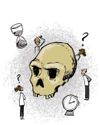يحاول ذهب - حر
THE RACE FOR THE MOON
April 2022
|BBC Science Focus
A new space race has begun. Over the coming years, an armada of rockets will head to the Moon to hunt down precious resources, satisfy the urges of billionaire tourists and maybe do some intriguing science along the way…

WHY NOW?
In a prolific flurry of activity between 1969 and 1972, NASA landed 12 astronauts on the Moon. Starting with Neil Armstrong's famous first steps, they explored the lunar surface, left experiments there for us to improve our knowledge and returned Moon rocks so we could learn about our neighbour's history and origins.
Yet achieving those historic feats did not come cheap. The total cost of the Apollo programme in today's money was $280bn, according to a recent estimate by The Planetary Society. That's more than the GDP of 78 per cent of the world's nations.
Adjusting the value to take into account changes to the USA's own GDP since the 1970s puts that figure at more like $641bn.
Ultimately, that money came from taxpayers, who were increasingly reluctant to sanction spending on something that had already been done six times. Schools and hospitals tend to be closer to people's hearts.
Fast-forward to today and we're in the midst of another space race, with a sizeable armada of spacecraft heading to the Moon in the years ahead. So what's changed?

First, taxpayers are no longer footing the entire bill. The last decade has seen an explosion in the number of private space companies, led by famous names like Elon Musk's SpaceX. By developing reusable rockets, they've driven down the cost of getting to space considerably. NASA already uses SpaceX technology to deliver astronauts and supplies to the International Space Station and they've inked deals to collaborate on sending landers to the Moon, too.
هذه القصة من طبعة April 2022 من BBC Science Focus.
اشترك في Magzter GOLD للوصول إلى آلاف القصص المتميزة المنسقة، وأكثر من 9000 مجلة وصحيفة.
هل أنت مشترك بالفعل؟ تسجيل الدخول
المزيد من القصص من BBC Science Focus

BBC Science Focus
PASS THE PLASTIC
All of us are ingesting microplastics. Could dietary fibre help us get it out?
3 mins
November 2025

BBC Science Focus
Finally... An EV worthy of your bedroom wall
Ferrari's new Elettrica could be the car that gets dyed-in-the-wool petrolheads to long for an EV. It could also be the car that reshapes the entire EV landscape
4 mins
November 2025

BBC Science Focus
THE PUDU
Just when you thought Bambi couldn't get any cuter, meet the pudu, the world's smallest deer. Standing little taller than a domestic cat, what it lacks in size, it more than makes up for in allure. Doe-eyed, button-nosed, with little legs and perky ears, this diminutive South American mammal looks like it has stepped straight out of a Disney film.
2 mins
November 2025

BBC Science Focus
60-year mystery of the fossil skull that baffled scientists may finally be solved
The Petralona skull was discovered in Greece in 1960, yet its origin has perplexed experts – until now
2 mins
November 2025

BBC Science Focus
Only 1% of the world is eating a healthy and sustainable diet
A major report found healthier diets could transform the food system
3 mins
November 2025

BBC Science Focus
COLD AND FLU SEASON
Nobody enjoys being stuck in bed sneezing and coughing the days away. But there are steps you can take to increase your chances of avoiding these winter ailments
4 mins
November 2025

BBC Science Focus
There's another diabetes in town, here's how to recognise it
Misdiagnosis rates for this rare type of diabetes could be complicating treatment for patients
5 mins
November 2025

BBC Science Focus
THE QUEST TO FIND THE EDGE OF THE SOLAR SYSTEM
NASA's newly launched IMAP mission is set to tell us more about the boundary between our Solar System and interstellar space than ever before
7 mins
November 2025

BBC Science Focus
WHICH VAPE FLAVOUR IS WORSE FOR YOU?
If you're trying to quit smoking, you'll have probably heard talk that switching to e-cigarettes - or vapes - is a healthier option. One study by researchers at University College London estimated that in 2017 alone, over 50,000 people stopped smoking thanks to their use of e-cigarettes.
2 mins
November 2025

BBC Science Focus
WANTED: GUT BACTERIA DEAD OR ALIVE
There are millions of bacteria living in our guts. There are millions of dead bacteria there too. And scientists are learning just how much potential the dead ones have to improve our health
7 mins
November 2025
Translate
Change font size
